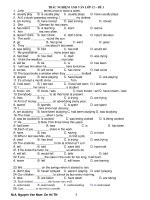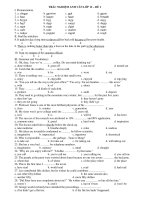ÔN THI TRẮC NGHIỆM ANH VĂN LỚP 12 - ĐỀ SỐ 16 ppt
Bạn đang xem bản rút gọn của tài liệu. Xem và tải ngay bản đầy đủ của tài liệu tại đây (104.12 KB, 3 trang )
Page 1 THE GCSE EXAMINATION
ÔN THI TRẮC NGHIỆM ANH VĂN LỚP 12 - ĐỀ SỐ 16
Choose the word whose underlined part is pronounced differently from the others:
1. a. hour b. hear c. hit d. hat
2. a. ache b. chemist c. cheerful d. scholarship
Choose the word whose main stress is placed differently from the others:
3. a. approximate b. accomplish c. invaluable d. expectation
4. a. relationship b. engineer c. ability d. enjoy
5. a. exhaust b. organic c. explain d. student
Make the correct choice:
6. The government has promised to deal with the problem of _____ among young people.
a. unemployment b. unemployed c. employer d. employee
7. Sometimes I have problems at work but _____ the whole I enjoy my job.
a. in b. on c. with d. at
8. I’ve lost my keys. Can you help me to look _____ them?
a. for b. after c. at d. up
9. We had an enormous meal. It consisted _____ seven courses.
a. off b. on c. of d. for
10. I hope you succeed _____ getting what you want.
a. for b. with c. on d. in
11. Somebody broke _____ my car and stole the radio.
a. in b. into c. through d. up
12. How much money do you spend _____ food each week?
a. with b. on c. about d. for
13. “Go on, finish the dessert. It needs _____ up because it won’t stay fresh until tomorrow.”
a. to eat b. eating c. eaten d. eat
14. This test is easy _____ me.
a. for b. to c. on d. in
15. We met when we were _____.
a. in holiday b. during holidays c. on holiday d. by our holidays
16. I will see him when he _______ here tomorrow.
a. comes b. will come c. has come d. had come
17. The boys broke a window when they ________ football.
a. played b. were playing c. had played d. are playing
18. This company offered _____ attractive jobs.
a. much b. a lot c. a great deal of d. a lot of
19. Were they _____ when they got the jobs?
a. satisfying b. satisfied c. satisfaction d. satisfactorily
20. I hope there won’t be too much difficulty _____ a work permit.
a. to get b. for getting c. with getting d. in getting
21. He said he was sorry that he had given me _____trouble.
a. so many b. so much c. very d. plenty
22. The newspaper report contained _____ important information.
a. many b. another c. an d. a lot of
23. Not until darkness fell _______ he hadn’t done half of his work.
a. that he realized b. did he realize c. that he didn’t realize d. didn’t he realize
24. “When _______?” - “In 1928”.
a. penicillin was discovered b. was penicillin discovered
c. did penicillin discovered d. did penicillin discover
25. I saw a thief take Norman’s wallet so I ran _______ him, but I didn’t catch him.
Page 2 THE GCSE EXAMINATION
a. into b. after c. over d. near
Identify one underlined word or phrase that is incorrect:
26. When my friend Tom will grow a beard, even his closest friends won’t recognize him.
A B C D
27. When I met him at the street, he was going to the pictures.
A B C D
28. I expect he will leave in France as soon as he gets a visa.
A B C D
29. He visited his friend yesterday and find that he had been out.
A B C D
30. Since she had been working at the hospital for two years, she decided to give up the job.
A B C D
Read the passage and make the correct choice:
What would happen (31) _____ there were a serious nuclear accident? And an accident must
be inevitable - sooner or (32) _____. Hugh areas would be evacuated, and they could (33) _____
contaminated with radioactivity for years. If it happened in your (34) _____, you wouldn't get a
penny in compensation. No insurance company (35) _____ nuclear risks. There are accidents. If
the nuclear industry didn't keep them (36) _____, there would be a public outcry. Radioactivity
causes cancer and may affect future generations. Next, nuclear waste. There is no technology for
absolutely safe disposal. Some of this waste will remain active for thousands of years. Is that
what you want to leave to your children? And their children's children? A reactor only lasts about
25 years. By the year 2000 we'll have 'retired' 26 reactors in the UK.
{ inevitable: sure to happen, evacuate: empty, compensation: sự bồi thường, cover: protect}
31. a. unless b. if c. otherwise d. when
32. a. better b. earlier c. later d. worse
33. a. remain b. maintain c. develop d. happen
34. a. career b. environment c. compartment d. area
35. a. pays b. covers c. gets d. makes
36. a. quietly b. quite c. quiet d. hardly
Read the passage carefully and then choose the best answer:
MICHAEL FARADAY
Michael Faraday was born in Newington, Surrey, England, on September 22, 1791, the son
of a blacksmith. He received little formal education, but while apprenticed to a bookbinder in
London he was able to read books on scientific subjects. In 1812, Faraday attended a series of
lectures given by the British chemist Sir Humphry Davy. Afterwards, he sent Davy a three
hundred-page book, complete with illustrations, based on notes he had taken during the lectures,
together with a request for employment. Davy was impressed, and Faraday was hired as his
assistant in 1813. Faraday was elected to the Royal Society in 1824, and was appointed director
of the laboratory of the Royal Institution in 1825. In 1833 he succeeded Davy as Fullerian
Professor of Chemistry at the Institution in 1833, a position he held for the rest of his life. In 1835
he was granted a pension of 300 pounds a year for life.
37. Michael Faraday is well-known for ______.
a. his scientific subjects b. his chemical laboratory
c. his request for employment d. his experiments on electricity
38. Newington is ______.
a. where he attended a series of lectures b. his home town
c. where he was apprenticed to a bookbinder d. where he worked as an assistant
39. What did his father do?
a. a bookbinder b. a chemist c. a blacksmith d. an apprentice
Page 3 THE GCSE EXAMINATION
40. Which of the following is NOT TRUE about him?
a. he attended school quite often b. he took careful notes at the lectures
c. he worked at the Royal Institution d. he rarely went to school
Choose the correct sentence which has the same meaning as the above one :
41. Her mother said, “Try to learn your lesson carefully, Lan”.
a. Lan’s mother said her to try to learn her lesson carefully.
b. Lan’s mother asked her to try to learn her lesson carefully.
c. Lan’s mother told her that to try to learn her lesson carefully.
d. Lan’s mother asked her if she tried to learn her lesson carefully.
42. Mary doesn’t have a modern calculator.
a. Mary wishes she doesn’t have a modern calculator.
b. Mary wishes she had had a modern calculator.
c. Mary wishes she had a modern calculator.
d. Mary wishes not to have a modern calculator.
43. He studied English at school. He succeeded in it.
a. He succeeded to study English at school. b. He succeeded in studying English at school.
c. He studied English at school successful. d. He studied English at school to succeed.
44. The children like to walk in the rain.
a. The children enjoy walking in the rain.
b. The children are interesting in walking in the rain. { interested is acceptable}
c. The children are bored with walking in the rain.
d. The children enjoy to walk in the rain.
45. The children couldn’t go swimming because the sea was rough.
a. The sea was too rough for the children couldn’t go swimming.
b. The sea was rough enough for the children to go swimming.
c. The sea was so rough that the children could go swimming.
d. The sea was too rough for the children to go swimming.
46. We learned this after a long time.
a. It took us to learn this for a long time. b. It’s a long time since we learned this.
c. We spent a long time learning this. d. We have learned this for a long time.
47. I’ll lend you the book, but you must promise to return it next week.
a. I’ll lend you the book unless you promise to return it next week.
b. I’ll lend you the book if you promise to return it next week.
c. I’ll lend you the book, otherwise you promise to return it next week.
d. If I’ll lend you the book, you must promise to return it next week.
48. The car is too expensive for him to buy.
a. He isn’t rich enough to buy that expensive car.
b. He is too rich to buy that expensive car.
c. He is so poor that he can buy that expensive car.
d. He is very rich; so he can buy that expensive car.
49. It is necessary to master English.
a. Mastered English is necessary. b. English, which mastered, is necessary.
c. That mastering English is necessary. d. It is necessary that English be mastered.
50. He is looking forward to hearing from her as soon as possible.
a. He expects to hear from her. b. He hates hearing from her.
c. He has no intention of hearing from her. d. He is tired of hearing from her.
THE END









